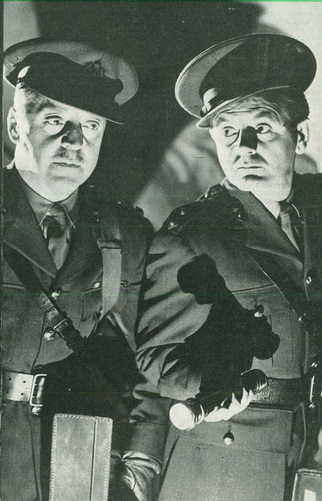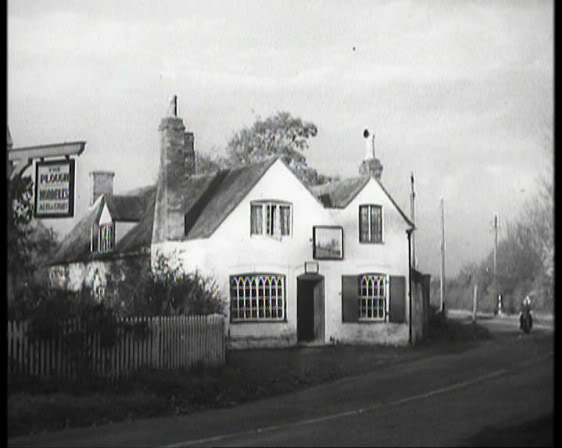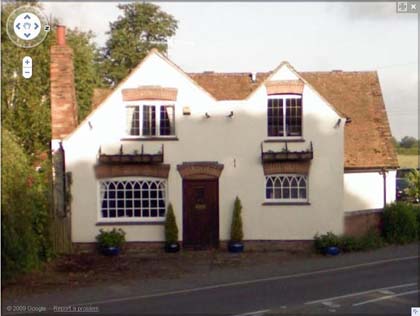Millions Like Us (1943)
Charters and Caldicott featured in this 1943 war propaganda film written and directed by Sidney Gilliat and Frank Launder. Other starts include Patricia Roc, Megs Jenkin, Eric Portman, Gordan Jackson and Anne Crawford.
Filmed at Gainsborough Studios, the plot starts in the summer of 1939 as the Crowson family holiday in southern England. As war breaks out, the film centres on a family’s contribution to the war effort on the homefront. Whilst the young men are off fighting the war, it falls on the older generations and women to keep the home fires burning, factories working and farms growing essential crops and livestock.
Jim Crowson (played by Moore Marriott joins the Home Guard. One of his daughters, Phyllis, joins the Auxillary Territorial Service whilst his other daughter Celia (played by Patricia Roc) is encouraged by her father to stay at home and look after him. She fears her father’s disapproval if she moves away from home but has desires on joining one of the more glamorous service options; instead she is called up to work in an aircraft factory. Initially disappointed, she soon enjoys the camaraderie, meets people from all walks of life and makes new friends.
Her new friends include the upper middle class Jennifer Knowles (Anne Crawford) and Welsh girl Gwen Price (Meg Jenkins). As the story develop, airman from a local base and the factory women are brought together at a local dance by their respective commanding officers and factory managers as a means of boosting morale. Interestingly, real airmen were used for the film. Among the airmen is Fred Blake (played by Gordon Jackson) who brings romance to Celia’s life. After hiccups in the romance, the two eventually marry and have a short honeymoon in the same place where the Crowson’s have their annual holiday – this time though the beach is covered in barb wire and other defences instead of holiday makers. At this point in the film, Charters and Caldicott make an appearance commenting on the mines being laid to thwart any German invasion.
The film shows how an ordinary family’s life is changed as a result of war with Germany, but nevertheless shows how the British spirit rises in the face of adversity and everybody pulls together for the defence of Britain.
Charters and Caldicott featured in this 1943 war propaganda film written and directed by Sidney Gilliat and Frank Launder. Other starts include Patricia Roc, Megs Jenkin, Eric Portman, Gordan Jackson and Anne Crawford.
Filmed at Gainsborough Studios, the plot starts in the summer of 1939 as the Crowson family holiday in southern England. As war breaks out, the film centres on a family’s contribution to the war effort on the homefront. Whilst the young men are off fighting the war, it falls on the older generations and women to keep the home fires burning, factories working and farms growing essential crops and livestock.
Jim Crowson (played by Moore Marriott joins the Home Guard. One of his daughters, Phyllis, joins the Auxillary Territorial Service whilst his other daughter Celia (played by Patricia Roc) is encouraged by her father to stay at home and look after him. She fears her father’s disapproval if she moves away from home but has desires on joining one of the more glamorous service options; instead she is called up to work in an aircraft factory. Initially disappointed, she soon enjoys the camaraderie, meets people from all walks of life and makes new friends.
Her new friends include the upper middle class Jennifer Knowles (Anne Crawford) and Welsh girl Gwen Price (Meg Jenkins). As the story develop, airman from a local base and the factory women are brought together at a local dance by their respective commanding officers and factory managers as a means of boosting morale. Interestingly, real airmen were used for the film. Among the airmen is Fred Blake (played by Gordon Jackson) who brings romance to Celia’s life. After hiccups in the romance, the two eventually marry and have a short honeymoon in the same place where the Crowson’s have their annual holiday – this time though the beach is covered in barb wire and other defences instead of holiday makers. At this point in the film, Charters and Caldicott make an appearance commenting on the mines being laid to thwart any German invasion.
The film shows how an ordinary family’s life is changed as a result of war with Germany, but nevertheless shows how the British spirit rises in the face of adversity and everybody pulls together for the defence of Britain.
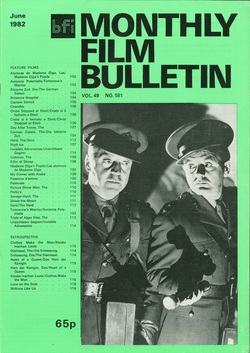
Monthly Film Bulletin
In June 1982, the British Film Institute, seeing the importance of war time propoganda films ran a feature on the film Millions Like Us. The film, almost 40 years old, was the subject of a 1300 word review by Tim Pulleine. He described the film as being overtly situated in a particular conjecture in British cinema, as well as in national life. He drew comparisons with Gainsborough's Bank Holiday film, as the opening scenes of Millions Like Us sees the working class Crawson family arriving for their 1939 seaside holiday. This is the first time that the Charters and Caldicott characters are seen in British uniforms and they are more lugubriously insouciant than ever. 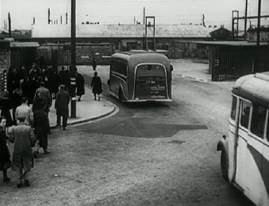
Facts about Millions Like Us After the outbreak of war, Launder and Gilliat continued to work apart on various films (all classics in their own right) until their collaboration with Carol Reed on the outbreak-of-war thriller Night Train to Munich in 1941. During the same period they worked together on several Ministry of Information propaganda shorts in support of the British War effort –
The success of Millions Like Us led to two ‘follow-up’ films in 1944 – Two Thousand Women and Waterloo Road. Millions Like Us was made on the back of female conscription in the National Service Act (No. 2) 1941 whereby all single women between the ages of 21 and 30 were required to work in the auxiliary forces, industry or agriculture as determined by the Government. Launder and Gilliat’s brief in making Millions Like Us was clearly propaganda led in making factory work for women appear in as positive a light as possible. A further propaganda message included in the film was to represent the different regions and classes of the British people all working together for the common good of Britain, and therefore included representatives of all nations and all classes rather than the upper middle classes which usually represented the British people in films of the era. Characters included Gwen from Wales, Fred from Glasgow, a Welsh male voice choir, a massed dance to the tune of Loch Lomond. The north of England was represented by Eric Portman playing Charlie Forbes and Terry Randall in her role of Annie Earnshaw – and as northerners they were ‘obviously’ working class and had a degree of comedy about them. Patricia Roc was cast as a working class girl, but being the star of the film came across as more middle class. The upper middle class were represented by Basil Radford and Naunton Wayne as the army officers Charters and Caldicott. Millions Like Us was, according to the film Director Paul Rotha, completely based on his film Night Shift. Frank Launder and Sidney Gilliat claim never to have seen Night Shift. Millions Like Us begins as the chronicle of a family responding to the changes wrought by the war. Patricia Roc's character, Celia, is considered a 'mobile woman' and therefore called up for National Service. She dreams of joining the FANYs and chauffeuring officers around in their line of duty.; this dream is quickly replaced by reality as she ends up working in an aircraft factory. The actual factory where the scenes were shot is the Castle Bromwich aircraft factory. At the end of the film, the song "Waiting at the Church" is sung by all. The emotive effect of this was also achieved with the same song in Arthur Askey's 1941 film "I Ask You", where the music hall singer Lily Morris sings it in an underground station used as an air-raid shelter. In Askey's film the song is used to present an image of nationhood and the community exerting an ideological pull. In Millions Like Us, the song is used as a means of bringing the isolated and recently widowed Celia, back into the collective warmth and strength of community. Soundtrack for Millions Like Us Symphony No. 5 in C minor, Op. 67 Music by Ludwig van Beethoven Played over main titles and later in the score Boomps-a-Daisy Written by Annette Mills Birthday of the Little Princess Written by Noel Gay Tantasquallen Music by Franz von Suppé Arranged by Hubert Bath When Day Is Done Music by Robert Katscher You're My Sweetheart Written by Art Noel and John Rivers Rebel from "The Freebooter Songs" Written by Sir William Wallace South of the Border Written by Jimmy Kennedy and Michael Carr Calling All Workers Music by Eric Coates Power House Music by Raymond Scott I'll Be There Music by Hans May Lyrics by Alan Stranks The Army, The Navy and The Air Force Music by Herman Darewski Lyrics by Edward Lockton Soldier Boy From Caroline Written by Jake Mahoney and John Rivers Here We Go Round the Mulberry Bush Traditional - Arranged by Louis Levy When the Blackbird Says Bye Bye Written by Art Noel, Don Pelosi and John Rivers No More Written by Harry Leon and John Rivers Seven Days of Heaven Written by Art Noel and John Rivers The Original Palais Glide Written by Will Grosz, Jimmy Kennedy and Michael Carr Pop Goes the Weasel Traditional - Arranged by Louis Levy Auld Lang Syne Traditional - Arranged by Louis Levy The Toy Trumpet Music by Raymond Scott Arranged by Robert Wendel Post Horn Gallop Traditional Colonel Bogey March Music by Kenneth Alford What More Can I Say? Written by Harry Leon and S.H. Colman Home! Sweet Home! Music by H.R. Bishop Lyrics by John Howard Payne Waiting at the Church Written by Vesta Victoria Sung by Bertha Willmott Mae Hen Wlad Fy Hhadau Written by Evan James and James James Performed by The South Wales Workers Choir Just Like the Ivy (I Cling to You) Written by A. J. Mills & Harry Castling Performed by Bertha Willmott |
Film Location This is the pub where Gordon Jackson's character took Patricia Roc to for a drink. It was The Plough Pub at 1 Abingdon Road, Dorchester-on-Thames and owned by Morrells Brewery. It is now a private residence 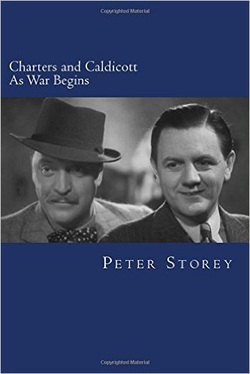
Charters and Caldicott: As War Begins
Charters and Caldicott - As War Begins covers the period in Charters’ and Caldicott’s screen life between 1938 and 1943 covering their first four film appearances - The Lady Vanishes, Night Train To Munich, Crook’s Tour and Millions Like Us - all classic films. This book brings together - for the very first time - all the scenes that they appeared in - telling the story of what Charters and Caldicott saw, what they said and what they understood to be happening. It tells the humorous way that Charters and Caldicott saw the world and the funny and exciting adventures that happened to them during this very turbulent time in world history. To purchase the book, click on the link below Cast and Crew
Directed by and an original screenplay written by Frank Launder Directed by and an original screenplay written by Sidney Gilliat Produced by Edward Black Caldicott Naunton Wayne Charters Basil Radford Fred Blake Gordon Jackson Celia Crowson Patricia Roc Phyllis Crowson Joy Shelton Jennifer Knowles Anne Crawford Charlie Forbes Eric Portman Gwen Price Megs Jenkins Elsie Crowson Valentine Dunn Jim Crowson Moore Marriott Tom Crowson John Boxer Mrs. Blythe Amy Veness Brenda Brenda Bruce Alice Avis Scott George Johnnie Schofield Mrs Hammond Grace Allardyce Annie Earnshaw Terry Randall Miss Wells Beatrice Varley Sam Jack Vyvyan Dr Gill John Salew Landlady Irene Handl Mrs Bourne Amy Dalby Miss Hodge, labour officer Hilda Davies Percy Hoskins Barry Steele Megs Angela Fouldes Ernie Arthur Denton The singer Bertha Wilmott Man at Dance hall Hugh Cross Roof spotter Albert Chevalier Roof spotter Frank Webster Man on pier John Slater Jonnie Terence Rhodes Handsome young man Paul Drake Wing commander Gordon Edwards Heavy rescue Clifford Cobbe Ugly youth Jonathan Field Squadron leader John Wynn Polish officer Courtney Luck Warrant officer Stan Paskin Uncredited Alan Haines Uncredited Hal Gordon Uncredited George Hirste Uncredited Hugh Cross Man Jack May |
